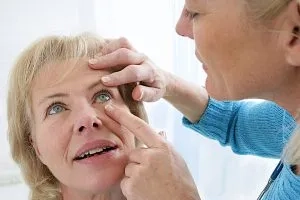For Patients

When thinking about whether vision correction surgery is right for you, and which care provider will best meet your needs, it is important to have an abundance of information. That is why Gimbel Eye Centre invests the time with each new patient to assess individual vision problems and explain the options that are right for each person.
Gimbel Eye Centre offers a full range of options for vision correction surgery (refractive surgery), including laser, implantable collamer lens implants, and refractive lens exchange options. We also perform a variety of advanced treatments for cataracts, retinal disease, glaucoma, diabetic retinopathy, and other eye conditions. Our skilled eye doctors will help you decide which option is the right one to correct your individual vision problems.
The following will give you an overview of eye and vision care at our practice, in addition to providing answers to frequently asked questions about services at Gimbel Eye Centre. Please don’t hesitate to contact us for more information, or to schedule a consultation.
- Are You a Candidate for Refractive Eye Surgery?
- Complimentary Assessment
- Contact Lens Removal Guidelines
- Guidelines for Healthy Eyes
- Financing Your Surgery
- Out-of-Town Patients
- General Eye Surgery FAQs
Are You a Candidate for Refractive Eye Surgery?
Generally, to be a candidate for surgery, you must:
- Be at least 18 years of age (21 for some procedures)
- Have stable vision for one year — minor fluctuations may not disqualify you
- Have a correctable vision problem
- Have eyes free of complicating injuries and diseases
- Must not be pregnant or nursing
While these qualifications serve as a guideline, a complete assessment is the best way to determine whether vision correction surgery can be performed for you. One of our experienced eye doctors will be happy to meet with you for a complimentary assessment and help you choose the most ideal treatment for your needs.
Complimentary Assessment
When you’re ready to take the next step, your Patient Counsellor will first discuss a series of questions with you before booking an appointment for an assessment of your eyes and vision. This appointment has no cost, will help you decide whether vision correction surgery is right for you, and which option will give you the results you are looking for. Although we have performed over 200,000 surgeries, we’ll only recommend a procedure if we’re confident that you’ll get the results that will satisfy you. We’ll provide you with all the information you need to make an informed decision. Please complete an Assessment Request Form online or call one of our counsellors (you’ll need to have your prescription ready). During your assessment, you’ll meet with a doctor to ask questions and talk about any concerns you might have. This appointment will give your surgeon all the information he or she needs to customize the procedure to your vision correction treatment. Our staff is always available to listen to and answer your questions and concerns. Please feel free to contact us at any time.
Contact Lens Removal Guidelines
At Gimbel Eye Centre, we’re committed to delivering the best possible visual outcomes – and that starts with a stable corneal surface. Wearing contact lenses can temporarily alter the shape of your cornea, which may affect your prescription.
To ensure the most accurate results, we ask that you stop wearing your contacts for a period before your appointments – including your pre-operative evaluation and any surgery, such as LASIK or implantable lens procedures. This allows your cornea to return to its natural shape, enabling a proper assessment.
For most patients, the recommended removal timelines below are sufficient.
LASIK/Intraocular Lenses
Type of lenses worn | Timeframe for lens removal |
Soft contact lenses | 48 hours |
Extended soft lenses (day and night) | 48 hours |
Toric soft lenses (astigmatism) | 48 hours |
Toric hard lenses (astigmatism) | 2 weeks |
Rigid gas permeables | 2 weeks |
True hard lenses (polymethylmethacrylate) | 2 weeks |
Please note: You only need to remove contact lenses in the eye(s) scheduled for surgery. When applicable, you may continue wearing a contact lens in the non-operated eye immediately after the procedure.
Every eye is different, so some patients may need more time for their corneas to stabilize. If your cornea hasn’t returned to its natural shape by your pre-operative appointment, your procedure may need to be rescheduled.
Longer removal periods – especially for out-of-town patients – can help prevent delays caused by corneal shape instability. Medical evidence also suggests that the longer contact lenses have been removed, the lower the likelihood of requiring an enhancement procedure.
Gimbel Eye Centre is not responsible for any costs associated with rescheduling, including travel, lodging, or time off work.
Guidelines for Healthy Eyes

Many of the things that affect the health of your body overall also affect the health of your eyes. Smoking contributes to the development of cataracts and retinal diseases, which can lead to blindness. Smokers are also less likely to benefit from treatment for retinal disease. Alcohol, high blood pressure, high blood sugar, and high blood cholesterol are also risk factors for developing some eye conditions (cataracts, macular degeneration, etc.). You should also avoid bright sunlight and wear sunglasses outdoors. Too much exposure to bright sunlight can damage the lens and retina of the eyes. Sunglasses should block out ultraviolet A and B radiation. Here are some general guidelines for healthy eyes:
- Eat a healthy and balanced diet
- Exercise regularly (consult a doctor before beginning any exercise program)
- Avoid harmful substances like cigarettes, excessive amounts of alcohol, and recreational drugs
- Arrange for regular eye exams
- Wear sunglasses outdoors
- Wear proper corrective lenses
- Give tired eyes a break
Also, if you wear contact lenses, you should follow the manufacturer’s instructions for cleaning. If contact lenses are used improperly, infections can occur and serious damage can be done to your eyes. And remember, always maintain your annual check-ups. Many eye conditions can be successfully treated and risks to vision can be reduced if caught in early stages!
Financing Your Surgery
We believe everyone should have access to quality eye care, which is why our office accepts a wide range of convenient payment methods for treatment.
Flexible Payment Options
Spread out your payments with Fairstone.*
We strive to make vision correction accessible—one way we do so is by offering flexible financing plans to make paying for your procedure easier on you.

*On approved credit. Terms and conditions apply. For more information on Vision Group Financing by Fairstone, click here.
® Trademarks of Fairstone Financial Inc.
Fairstone Financial Inc. is a wholly owned subsidiary of Fairstone Bank of Canada.
Out-of-Town Patients
If you are visiting Gimbel Eye Centre from another part of Canada or the world, our office has established partnerships with local hotels and bed-and-breakfasts to offer discounts on accommodations. We welcome all out-of-town patients who have chosen us for their eye care needs.
General Eye Surgery FAQs
Does surgery hurt?
Eye surgery typically does not hurt. Depending on the type of procedure, some patients may experience mild discomfort after surgery; this can be relieved with medication. Patients who have PRK generally report more discomfort than with other vision correction procedures. Our doctors will talk more with you about what you can expect for specific procedures, and how any post-operative discomfort can be managed, once they have met with you for your initial consultation.
What are the risks / side effects?
While there are risks associated with any surgery, the risks associated with vision correction surgery are extremely low. Some side effects can be felt by the patient during the healing process (for example, dry eyes, halo effect of lights at night, light sensitivity), but these effects almost always go away once the eyes have completely healed. Your doctor will fully explain the risks and side effects during your consultation and how they can be treated if they occur.
How long will the correction last?
The vast majority of patients who need low to moderate corrections have normal vision (near 20/20) after surgery. Refractive surgery does not prevent progressive myopia, and every effort is made to confirm that the vision is stable before performing a vision correction procedure. Also, as we age, we all will eventually need some form of vision correction (usually reading glasses or bifocals). People who have had vision correction surgery will also need similar kinds of corrections.
Can both eyes be done at the same time?
In most cases, laser and lens procedures allow both eyes to be done at the same time. The preferences of the patient, as well as the recommendations of the surgeon, are considered on a case-by-case basis.
What is monovision?
This is a condition where one eye (usually the dominant one) is corrected fully for distance vision and the other eye is corrected for a small amount of nearsightedness. This can provide reasonably good distance vision and near vision without the need for glasses. This can be especially useful for people who have reached the point where they would need reading glasses if both eyes are fully corrected for distance.
When can I drive?
Once your eyes have reached the Alberta legal driving measurement (20/50 with both eyes, or 20/30 with one eye) you will be able to drive. This usually happens within a day or two with most surgeries, and up to two weeks with PRK.
When can I return to work?
Most people can return to work within two to four days. If you have PRK (and have both eyes corrected at the same time) you should plan on being away from work for 7 – 10 days. If you choose PRK and can’t be away from work that long, you can choose to have one eye done at a time and likely continue working without interruption.
How long will I be on medication?
This depends on how long you take to heal, what procedure you have had, and the level of correction. Generally, the need for medication gradually lessens and is taken for one week up to several months.
Can I wear contacts afterwards?
Typically, if you were able to wear contacts before surgery, you will be able to wear them after surgery. But most people do not need to wear contacts following surgery.
Can I have surgery after the age of 50?
Generally, people over 50 will still need reading glasses after surgery. With patients over the age of 60 we generally recommend refractive lens exchange; however, this will be determined and discussed during your assessment.
Can I still have cataract surgery at Gimbel Eye Centre?
Yes – we still offer cataract surgery services.
Does Alberta Health still pay for my cataract surgery?
Yes, cataract surgery is still insured by Alberta Health, and Gimbel Eye Centre surgeons continue to provide insured services. With Alberta Health, patients will not pay for the cataract surgery itself.
If you have additional questions, or if you are ready to schedule your complimentary assessment, please contact Gimbel Eye Centre.





